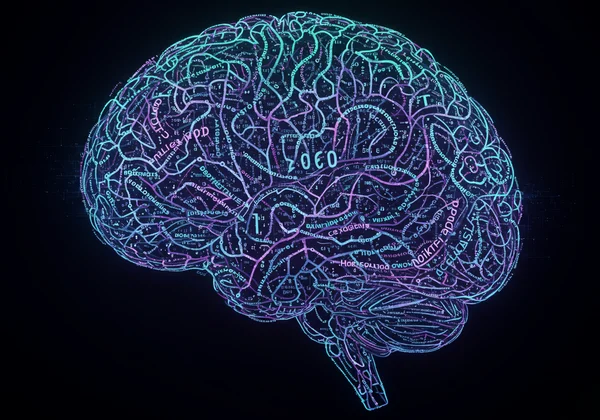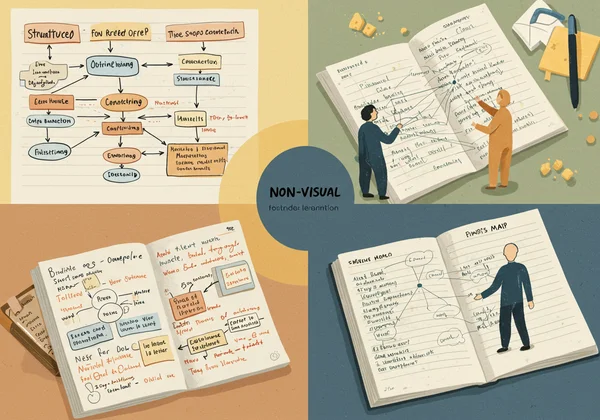Aphantasia Test: Living with Mind Blindness & Practical Tips for Daily Life
Discovering you have aphantasia, the inability to voluntarily create mental images, can be a profound moment of self-realization. It often comes with a flood of questions about your past, present, and future. For many, the journey of living with aphantasia begins with a single, pressing thought: Have you ever wondered what to do after discovering you have aphantasia? You are not alone, and this new understanding is not an endpoint but a starting point for exploring the unique and powerful ways your mind works.
This guide offers practical tips and strategies for navigating daily life with aphantasia. It’s about moving from "What does this mean?" to "How can I thrive with this?" Understanding your cognitive style is the first step, and if you're curious about where you fall on the spectrum of visual imagery, you can always explore your cognition on our platform.
Understanding Aphantasia: Your Cognitive Blueprint
Before diving into coping strategies, it's crucial to grasp what aphantasia is—and what it isn't. It's not a disorder or a deficit; it's a variation in human cognition. Think of it as your mind's unique blueprint for processing information, one that relies less on visual data and more on facts, concepts, and semantics. This understanding is key to unlocking your potential.

What Does Aphantasia Mean for Your Daily Experience?
For individuals with aphantasia, the "mind's eye" is blind. When asked to picture a loved one's face or a sunny beach, you might know the details—the color of their eyes, the sound of the waves—but no actual image appears in your mind. This can affect how you reminisce, read descriptive passages in a book, or follow guided meditations that rely on visualization. Recognizing these moments is the first step toward developing alternative, non-visual techniques.
Is Aphantasia Neurodivergent? Exploring the Spectrum
The term neurodivergent refers to brains that function in ways that diverge from the dominant societal standard. While aphantasia is not officially classified as a form of neurodivergence like autism or ADHD, many in the community view it as part of the broader spectrum of cognitive diversity. It highlights that there is no single "correct" way for a brain to operate. Embracing this perspective helps shift the focus from what you lack to what your unique cognitive style enables you to do differently and, in some cases, more effectively.
Mastering Memory & Learning with Aphantasia
One of the most common concerns for people with aphantasia revolves around memory and learning. Without a mental photo album to scroll through, how do you recall the past or absorb new information? The answer lies in leveraging other powerful memory systems that don't rely on visual imagery.
How Do People with Aphantasia Remember Things? New Approaches
While you may have a different experience with episodic memory (recalling personal events), your semantic memory (general knowledge and facts) is often highly developed. To strengthen your recall, focus on non-visual cues:
- Verbal & Factual Association: Instead of picturing an event, recall the facts. Who was there? What was said? What was the sequence of events? Create a story or a list of details in your mind.
- Emotional & Sensory Recall: Connect memories to feelings, sounds, smells, or tastes. You might not see your childhood kitchen, but you can remember the smell of baking bread or the warmth of the room.
- Spatial & Kinesthetic Memory: Remember the layout of a room or the physical feeling of an action. Many with aphantasia have an excellent sense of direction or can remember processes by mentally "walking through" the steps.
Enhancing Learning Without Visual Imagery
Traditional study methods often lean heavily on visualization. However, there are many effective learning techniques perfectly suited for a non-visual mind. Try incorporating these aphantasia coping strategies:
-
Concept Mapping: Instead of mind maps with images, create structured outlines or flowcharts that connect ideas logically with words and arrows.
-
Detailed Note-Taking: Focus on writing or typing thorough notes. The act of translating concepts into words reinforces learning and creates a factual record to review.
-
Teach it Back: Explaining a concept to someone else (or even to yourself out loud) forces your brain to organize the information logically and semantically, solidifying your understanding.

Can People with Aphantasia Enjoy Reading? Tips for Engagement
Absolutely! While you may not visualize the fantastical worlds described in a novel, you can engage deeply with other elements. Focus on the plot's intricacies, the character's emotional journeys, the cleverness of the dialogue, and the author's underlying themes. Many people with aphantasia report that they experience stories as a stream of concepts, allowing for a unique and equally rich reading experience. To better understand your own cognitive profile, consider taking an aphantasia self-assessment.
Navigating Relationships: Explaining Aphantasia to Others
Communicating your internal experience to friends, family, and partners can be challenging but is essential for mutual understanding. Finding the right words can bridge the gap between their visual world and your conceptual one. This is a key area for developing aphantasia tips that work for you.
Do People with Aphantasia Have Trouble Remembering Faces? Social Impacts
Some individuals with aphantasia report difficulty recognizing faces, a condition known as prosopagnosia. While the two are distinct, they can co-occur. More commonly, you might remember a person through a collection of facts: their name, their profession, the last conversation you had, and the sound of their voice. Be open about this. Simply saying, "I sometimes have trouble placing faces, so please don't be offended if I need a reminder of your name," can prevent misunderstandings.
Simple Ways to Communicate Your Unique Perspective
Explaining aphantasia doesn't have to be complicated. Use simple analogies to describe your experience. You could say, "My brain is like a computer that knows all the data about an image—its size, color, and context—but doesn't have a screen to display it." Or, "When you say 'picture an apple,' I know it's red, round, and has a stem, but I don't see one in my head." Finding a clear, concise way of how to explain aphantasia can be incredibly empowering for both you and the person you're talking to.

Embracing Your Strengths: The Advantages of Aphantasia
Living with aphantasia isn't just about finding workarounds; it's also about recognizing the inherent strengths that come with your cognitive style. Many people with aphantasia discover they have powerful abilities in areas that don't rely on visual thought.
What Are People with Aphantasia Good At? Highlighting Strengths
Research and anecdotal evidence suggest several potential advantages associated with aphantasia. These can include:
- Abstract Thinking: Minds that aren't tied to concrete images can often excel at conceptual and logical reasoning, making fields like mathematics, programming, and philosophy a natural fit.
- Living in the Moment: Without a constant stream of mental images from the past or future, many report feeling more present and grounded in their current reality.
- Reduced Intrusive Imagery: Some studies suggest that individuals with aphantasia may be less susceptible to aversive memories or the traumatic flashbacks associated with conditions like PTSD.
- Objective Problem-Solving: By focusing on facts and data rather than imagined scenarios, you may be able to approach challenges with greater objectivity.
Cultivating Self-Acceptance and Growth
Ultimately, the most important step is to cultivate self-acceptance. Your mind is not broken; it's different. This realization is a cornerstone of personal growth. Embrace the journey of understanding your unique mind. Let go of the pressure to be like everyone else and start celebrating the clarity and focus your conceptual thinking provides. A great way to begin this journey is to take our free aphantasia test and gain personalized insights.

Continuing Your Journey: Growth and Self-Discovery with Aphantasia
Living with aphantasia is a continuous journey of discovery, adaptation, and empowerment. By understanding your cognitive blueprint, developing new strategies for memory and learning, communicating your experience effectively, and embracing your unique strengths, you can lead a rich and fulfilling life. Your mind's eye may be blind, but your capacity for understanding, connection, and growth is limitless.
Ready to take the next step in your self-discovery journey? Take our free aphantasia test to explore your mind's eye and unlock a deeper understanding of your cognitive profile.
Your Questions on Living with Aphantasia Answered
Can aphantasia be overcome or improved?
Currently, aphantasia is understood as a stable cognitive trait rather than a condition to be "cured" or overcome. While some people report slight changes in their imagery ability over time or through specific practices like meditation, the focus should be on learning to work with your mind as it is, rather than trying to fundamentally change it.
What are the common challenges faced by people with aphantasia?
Common challenges include difficulty with tasks that require strong visualization, such as certain artistic endeavors, guided imagery, or remembering visual details from the past. Some also find it hard to explain their internal experience to others, which can sometimes lead to feelings of isolation until they find a community that understands.
Where can I find a reliable aphantasia test?
For those looking to formally assess their ability to visualize, finding a scientifically inspired tool is key. You can find a reliable aphantasia test on our website, designed to help you quantify the vividness of your visual imagery and provide a clearer picture of your unique cognitive style.
Disclaimer: This article is for informational purposes only and is not a substitute for professional medical or psychological advice, diagnosis, or treatment. Always seek the advice of a qualified health provider with any questions you may have regarding a medical condition.